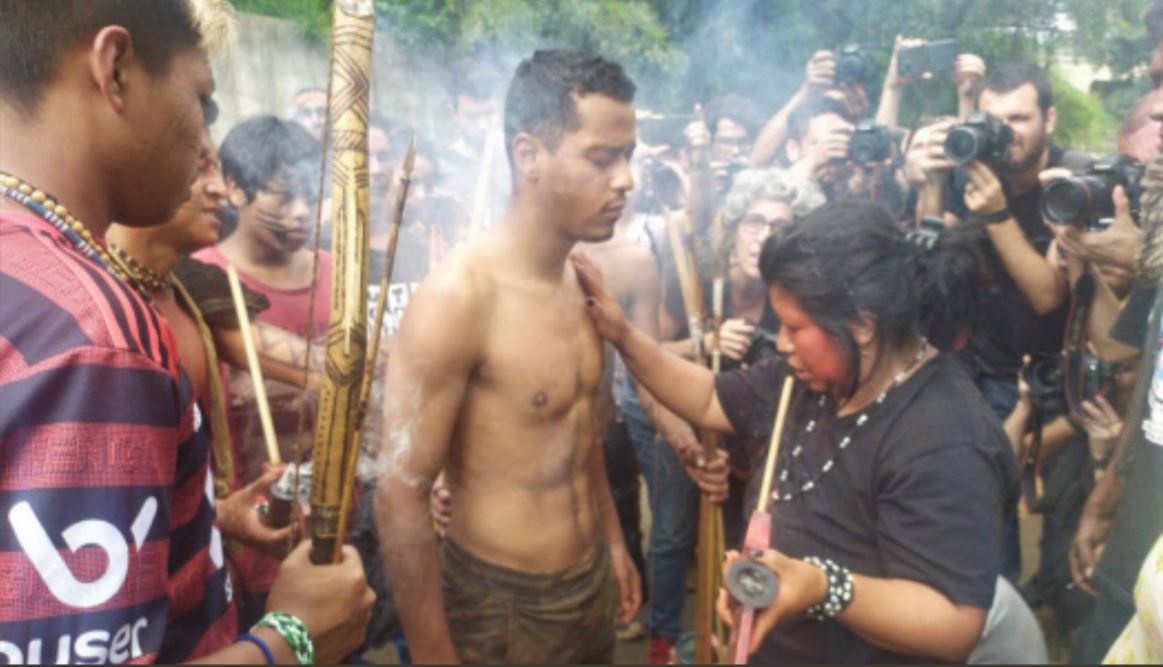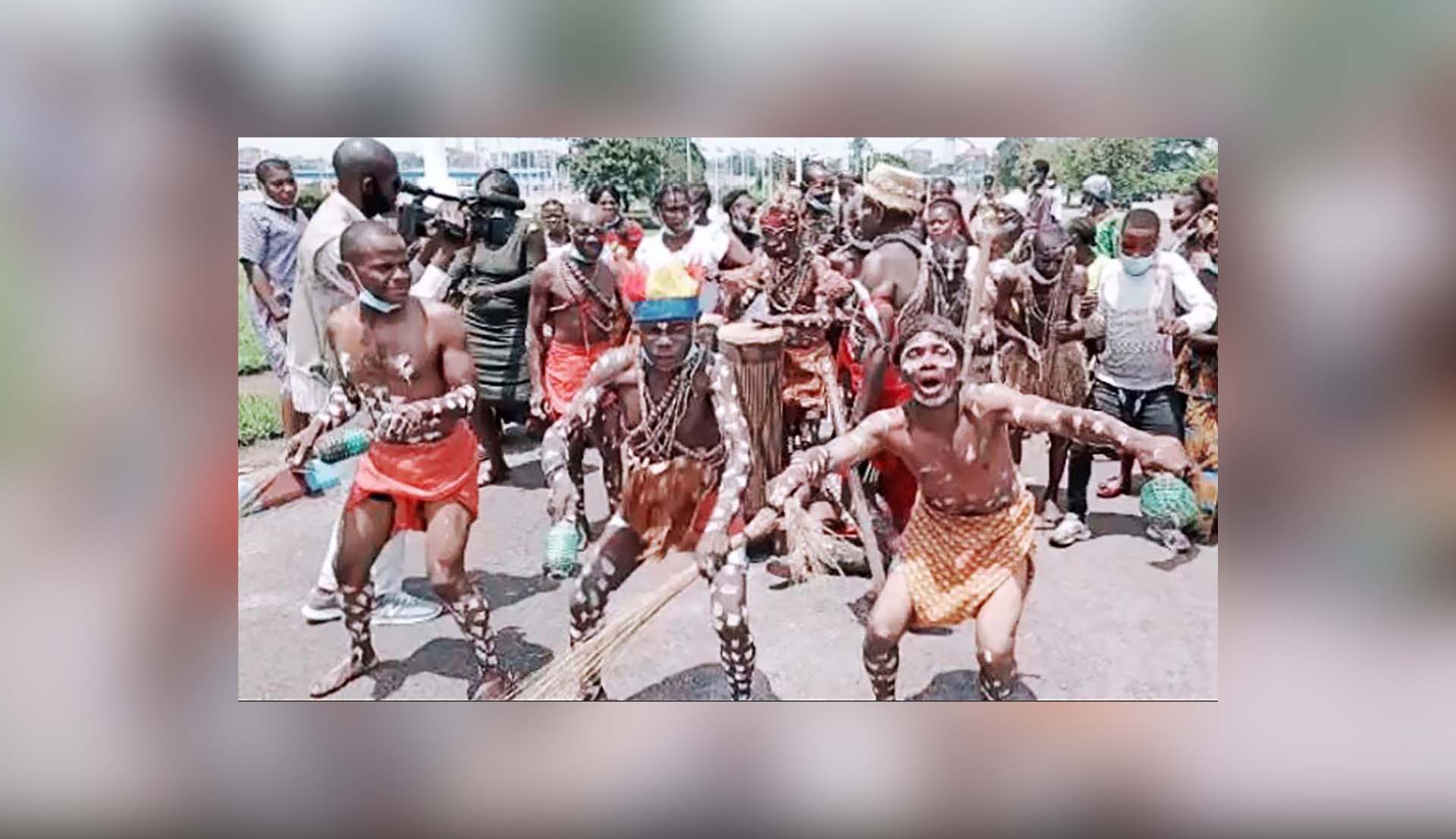Despite measures enforced in relation to the pandemic such as travel restrictions, lockdowns and confinement, among others, armed conflicts that have plagued the country since the end of the civil war in 2003 continue. Between March 23 to May 14, 2020 alone, “more than 480,000 people were forced to leave their homes due to clashes between armed groups and the country’s military, accounting for 75% of the total number of people displaced worldwide.”1
The armed groups are responsible for kidnap-for-ransom, sexual violence and torture of a number of Indigenous Peoples, particularly women and girls. In 2020, at least 200 people were abducted for ransom in North Kivu province.2 These incidents are rarely, if ever, brought to justice.
Although the country has a relatively low number of official COVID-19 cases, the pandemic aggravated the already dire situation of Indigenous Pygmy
Peoples. The closure of cities and the large shopping centers prevented and limited their mobility and affected those whose livelihoods depend on either selling their non-timber forest products or having daily wage jobs in urban centers. This also affected their already limited access to food and potable water. Furthermore, many became vulnerable to arrests and forced to pay heavy fines for not complying with the requirement of wearing face masks, mostly because they can’t afford them.
Between March and May 2020, around 57 Indigenous Pygmy Peoples in Kinshasa, North Kivu, and South Kivu were arrested for failing to wear face masks.3
In addition, national park rangers, also known as ‘eco-guards,’ pose similar threats to the safety and security of Indigenous Peoples living around these parks. From November 30 to December 31, 2020, ‘eco-guards’ from two of the seven national parks in DRC were involved in the killing of five Batwa men, injuring several others, rape of an Indigenous Pygmy woman, and torture of three others.4 These are just few incidents from the numerous other human rights violations involving the ‘eco-guards’5 who are emboldened by the persistence of conservation management that is rooted on colonialism.6
Discrimination is another challenge that renders Indigenous Pygmy Peoples vulnerable to being displaced from their ancestral lands. Local government officials take advantage of their ignorance of their rights and of the law. Diel Mochire, director of Programme Intégré Pour Le Développement du Peuple Pygmée au Kivu (PIDP-Kivu) said while explaining the vulnerability of Indigenous Peoples to arrest, imprisonment and criminalization, “People in power profit from other people’s ignorance.” Government authorities use their power to influence the police and judicial processes to frustrate Indigenous Peoples’ efforts to protect their land rights. They also take advantage of the Indigenous Pygmy Peoples’ fear of the armed groups when criminalizing or scaring them out of their ancestral lands. Those known to be outspoken and aware of their rights are particularly vulnerable to attacks.
On April 7, 2021, the National Assembly adopted the Bill on the Protection and Promotion of the Rights of Indigenous Pygmy Peoples, which indigenous activists considered the most important and difficult hurdle in the legal process. The adoption provides hope for change in their situation and is considered a huge step towards a law that will recognize and better protect and promote their rights as Indigenous Peoples of DRC.
INDIGENOUS BATWA LAND RIGHTS DEFENDERS ARE CONTINUOUSLY THREATENED TO LEAVE THEIR CUSTOMARY LANDS
The Indigenous Bambuti community in Miano locality,* Ufamandu in Bahunde Chiefdom are under constant threat from the Chief of Miano, Mutenda Mufula. At the start of 2020, he had two members of the Bambuti family imprisoned.
Bambwisho Lwaenda, 38, and Mastaki Sakasangwa, 66, were arrested on January 13 and February 13, respectively. Bambwisho was arrested for “contempt towards authorities” after he refused to leave his customary land upon the order of Chief Mutenda. Mastaki, on the other hand, was charged for “inciting tribal hatred” after he was caught mobilizing his community. He is active in raising the community’s awareness of their rights. He also documents and denounces cases of human rights violation.
Bambwisho is protecting his customary lands in Lubirizi while Mastaki is protecting his in Bumba/Kanyaru. Their fertile customary lands are theirmain sources of livelihood, food and shelter. Unaccustomed to measuring their lands using any metric system, they just know that the extent of their lands is vast enough for their animals to graze with enough rivers, valleys and hills. Their lands are also important spaces where they observe and preserve their customary practices.
Chief Mutenda wants to convert the customary lands for agribusiness with farm workers employed by him. He uses his position and influence to mobilize the police to actively go after about 105 Indigenous Pygmy families living in Miano and evict them from their customary lands. He is known to look down on Indigenous Pygmy Peoples – a common attitude in DRC where discrimination against them is rampant.
Bambwisho was imprisoned for ten days while Mastaki for two. Both were released after paying their fines; Bambwisho with two goats, two hens and 80,000 Congolese Francs (about 40 USD) while Mastaki with three goats and one crate of Primus beer which cost him around 2,0000 Congolese Francs (about 18 USD).
The conflict between Chief Mutenda and the Bambuti family did not stop with the release of Bambwisho and Mastaki from prison. They are constantly threatened with death, arrests and legal charges. With Chief Mutenda’s influence on local courts, the Bambuti family is frustrated with the legal system and vulnerable to the Chief’s abuse of power.

INDIGENOUS BATWA LEADER IN KYANINGA TARGETED FOR FIGHTING FOR HIS COMMUNITY’S LAND RIGHTS
On February 13, 2020, Balume Mwenda Mushingwanwa, an Indigenous Batwa human rights defender of the Kyaninga locality, was imprisoned at the Police Nationale Congolaise (PNC) station of Nyabyondo, which is 10 kilometres from his home. Chief of Kishonja, Masumbuko Byakunda Sylvain, reported to the PNC that Balume was collaborating with the armed group Alliance des Patriotes pour un Congo Libre et Souverain (APCLS). The police, without any verification, believed Masumbuko and acted upon his report.
Since 2011, there has been a land conflict between Masumbuko and Babitindwa Nguli, the Mwamitwa or the customary Chief of the Bambuti family of Kyaninga locality, where Balume belongs. Masumbuko has been eyeing control of the Bambutis’ ancestral lands - Kanyamisindo Hills - to exploit for his own profit.
Balume, a father of eight, leads his community’s struggle to protect Kanyamisindo Hills. An active community organiser, he helps in raising
the awareness of his community on their collective rights to their lands and territories, and self-determination. Because he knows his rights and actively shares that knowledge to the rest of his community, he became a target of the Chief of Kishonja who abuses his position.
Criminalizing Indigenous Pygmy Peoples by linking them to armed groups is a common practice of those in conflict with them. Balume, released after four days in prison, remains vulnerable to threats and attacks because of his activism. He participated in a training of a local indigenous organisation, Programme Intégré pour le Développement du Peuple Pygmé’s (PIDP) on monitoring, documenting and reporting cases of human rights violations in 2012. He has since been keen in applying the knowledge and skills acquired from the training to help protect his community from being taken advantage of by people like the Chief of Kishonja or the police.
Through the mediation of the Baraza La Wazee or the Council of Elders, the conflict over the Kanyamisindo Hills was resolved through an agreement between the Chief of Kishonja and the Mwamitwa of Bambuti family. Both parties signed an agreement to respect each other and not encroach in each other’s territorial boundaries. The Bambuti were also provided with seeds to nurture in their lands.
Notwithstanding the signed agreement, the security forces, particularly the PNC of Nyabyondo Chiefdom, the Congolese army, the Forces Armées de la République Démocratique du Congo (FARDC) and the national intelligence agency, Agence Nationale de Renseignement (ANR), remain as threats to Balume’s activities as an indigenous human rights defender.
Read and download the full IPRI's 2021 Annual Criminalization report here.


%2020.49.20.png)
